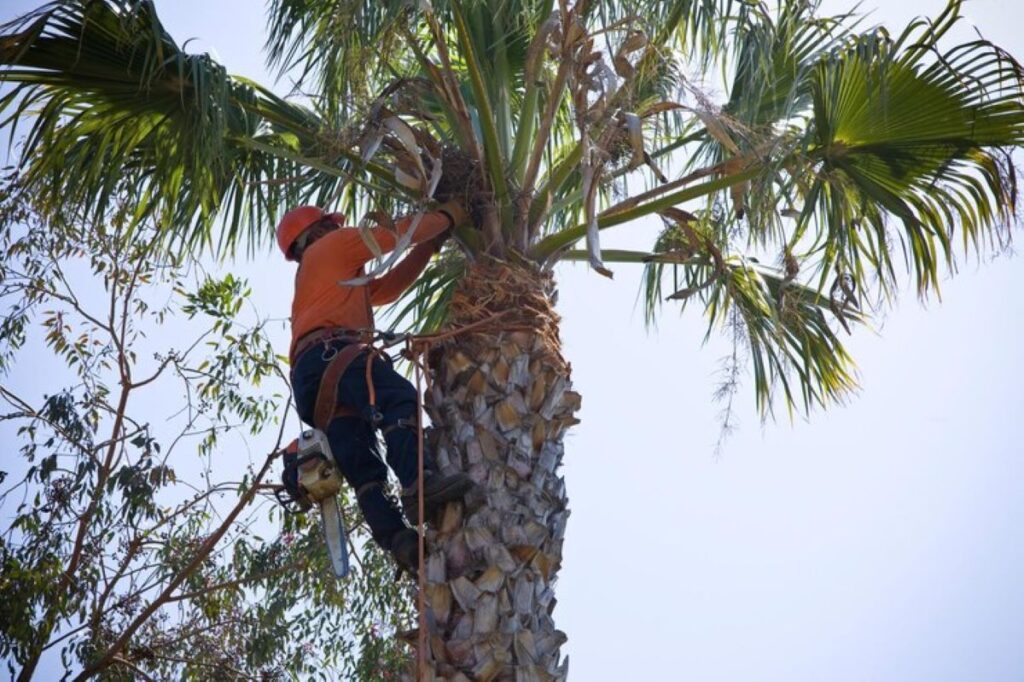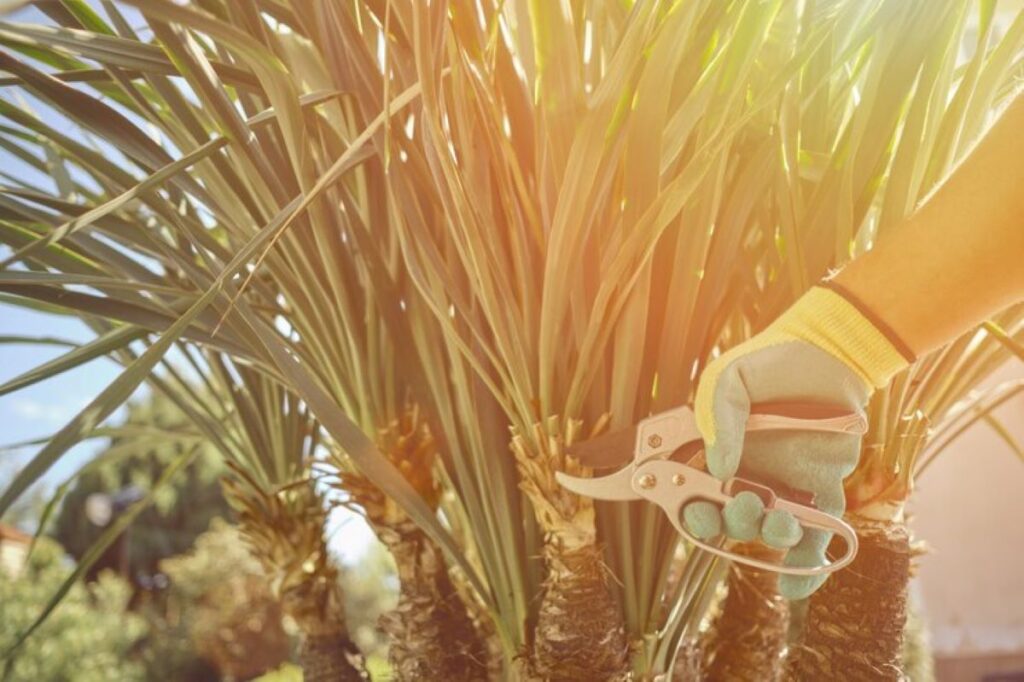Palm trees are a stunning addition to any landscape, offering a touch of tropical elegance and a sense of relaxation. However, to maintain their beauty and health, proper pruning is essential. This article delves into the importance of palm tree pruning, the best practices to follow, and tips for keeping your palms in top condition.
The Importance of Pruning Palm Trees
Pruning is not merely about aesthetics; it plays a crucial role in the overall health and longevity of palm trees. Regular pruning helps to remove dead or damaged fronds, allowing the tree to focus its energy on new growth. Additionally, it can prevent pest infestations and diseases that thrive on decaying plant material.
Enhancing Aesthetic Appeal
One of the primary reasons for pruning palm trees is to enhance their visual appeal. Over time, palm fronds can become unsightly, particularly when they turn brown or yellow. By removing these fronds, the tree appears healthier and more vibrant. This is especially important for palms situated in prominent locations, such as gardens, parks, and commercial properties. Moreover, a well-pruned palm can serve as a striking focal point in landscaping, drawing the eye and creating a sense of elegance and sophistication. The graceful arching of the remaining fronds can complement surrounding flora, contributing to a harmonious outdoor environment.
Promoting Healthy Growth
Pruning encourages healthy growth by allowing sunlight to penetrate the canopy and air to circulate around the tree. This is particularly vital for younger palms, which may struggle to thrive if their fronds are overcrowded. By selectively removing older fronds, the tree can direct its resources towards new growth, resulting in a more robust and vigorous palm. Furthermore, proper pruning techniques can help to shape the palm, ensuring that it grows in a balanced manner. This not only enhances its structural integrity but also reduces the risk of wind damage, which can be a significant concern in storm-prone areas.
Preventing Pests and Diseases
Dead or dying fronds can attract pests and diseases that can compromise the health of the palm. Regular pruning helps to eliminate these potential threats, ensuring that the tree remains healthy and free from infestations. Furthermore, maintaining a clean environment around the base of the palm can deter pests from taking up residence. It is also advisable to inspect the palms regularly for signs of disease or pest activity, as early detection can make a significant difference in the management of these issues. Implementing an integrated pest management approach, which includes pruning, can lead to healthier palms and a more sustainable landscape overall.
When to Prune Palm Trees
The timing of pruning is crucial for the health of palm trees. Understanding the right season and conditions can make a significant difference in the outcome of your efforts.
Seasonal Considerations
In Australia, the best time to prune palm trees is during the late winter to early spring months. This period coincides with the tree’s natural growth cycle, allowing it to recover quickly from any pruning. Pruning during the dormant season can stress the tree and hinder its growth. Additionally, the warmer temperatures and increased rainfall during spring promote vigorous new growth, which can help the palm tree heal more efficiently after being pruned.
Signs That Pruning is Needed
It is essential to recognise when a palm tree requires pruning. Signs include yellowing or browning fronds, fronds that are hanging down excessively, or the presence of dead fronds. If a palm appears unkempt or has a significant number of damaged fronds, it is time to consider pruning. Beyond these visible indicators, it is also wise to monitor the overall health of the tree. If you notice a decrease in growth or the tree seems to be struggling to thrive, it may be beneficial to assess its condition more closely. Regular inspections can help catch issues early, preventing more extensive damage that might require drastic measures.
Tools and Techniques for Pruning
Having the right tools and techniques is vital for effective palm tree pruning. Using appropriate equipment not only makes the job easier but also ensures that the tree remains unharmed during the process.
Essential Tools
Some of the essential tools for pruning palm trees include:
- Hand Pruners: Ideal for smaller fronds and precise cuts.
- Loppers: Useful for thicker fronds that require more leverage.
- Chainsaw: Necessary for larger palms or when removing entire fronds.
- Safety Gear: Gloves, goggles, and a hard hat are crucial for personal protection.

Pruning Techniques
When pruning, it is vital to follow specific techniques to ensure the health of the tree:
- Cut at the Base: Always cut fronds at their base, close to the trunk, to promote faster healing.
- Avoid Over-Pruning: Only remove fronds that are dead or significantly damaged. Over-pruning can stress the tree.
- Use Clean Cuts: Ensure that all cuts are clean and precise to reduce the risk of disease.
Proper Disposal of Debris
After pruning, it is essential to dispose of the debris properly. Leaving dead fronds around the base of the tree can attract pests and diseases. Composting or disposing of the fronds in green waste bins is advisable to maintain a clean environment around the palm.
In addition to proper disposal, it is beneficial to regularly inspect the area surrounding the palm tree for any signs of pests or disease. This proactive approach can help in identifying potential issues before they escalate. Furthermore, consider using organic mulch around the base of the palm after pruning; this not only enhances the aesthetic appeal but also helps retain moisture and suppress weeds, creating a healthier growing environment for the tree.
Another important aspect of palm tree care post-pruning is to monitor the tree’s growth and overall health. Observing how the palm responds to pruning can provide valuable insights into its needs. If the tree shows signs of stress, such as yellowing fronds or stunted growth, it may require additional care, such as fertilisation or adjustments in watering practices. Understanding the specific species of palm and its unique requirements can significantly enhance its resilience and longevity.
Common Mistakes to Avoid
Even experienced gardeners can make mistakes when it comes to pruning palm trees. Being aware of these common pitfalls can help ensure that your palms remain healthy and beautiful.
Over-Pruning
One of the most common mistakes is over-pruning, which can severely damage the tree. Palm trees rely on their fronds for photosynthesis and energy production. Removing too many fronds can weaken the tree and make it more susceptible to disease.
Ignoring the Tree’s Natural Shape
Another mistake is failing to respect the natural shape of the palm. Each species of palm has a unique growth habit, and pruning should enhance this natural form rather than alter it. Understanding the specific needs of the palm species in your garden can lead to better pruning outcomes.
Pruning at the Wrong Time
Pruning at the wrong time of year can hinder growth and recovery. As mentioned earlier, late winter to early spring is the ideal time for pruning in Australia. Pruning during the growing season can stress the tree and lead to poor health.
Aftercare Following Pruning
After pruning, providing proper care is essential for the recovery and health of the palm tree. This includes adequate watering, fertilisation, and monitoring for pests.
Watering and Fertilisation
Following pruning, it is crucial to ensure that the palm receives sufficient water. Newly pruned palms may require more frequent watering to support new growth. Additionally, applying a balanced fertiliser can provide the necessary nutrients to promote recovery and growth.
Monitoring for Pests
After pruning, keep an eye on the palm for any signs of pests or diseases. Regular inspections can help catch any issues early, allowing for prompt treatment. Implementing preventative measures, such as maintaining a clean environment and using organic pest control methods, can also be beneficial.

Conclusion
Pruning palm trees is an essential practice for maintaining their health and beauty. By understanding the importance of pruning, knowing when and how to prune, and avoiding common mistakes, palm owners can ensure their trees thrive for years to come. With the right tools, techniques, and aftercare, these magnificent trees can continue to enhance landscapes across Australia, providing shade, beauty, and a touch of the tropics.
In conclusion, regular maintenance through pruning not only improves the aesthetic appeal of palm trees but also contributes to their overall health and longevity. By following best practices and staying vigilant, palm enthusiasts can enjoy the beauty of these iconic trees while ensuring they remain vibrant and healthy.
Related : Benefits of Hiring an Arborist in Sydney’s Eastern Suburbs

